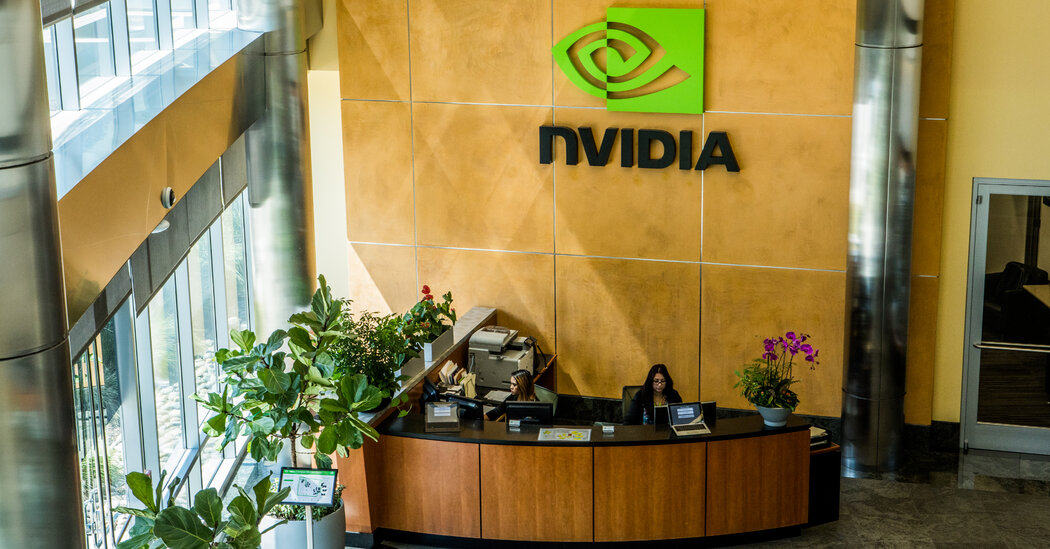
SAN FRANCISCO — Nvidia, the Silicon Valley chip maker, has ended its nearly 18-month effort to buy Arm, which licenses chip technology used in most smartphones.
Nvidia, a fast-growing company whose chips are best known for rendering images in video games, in September 2020 offered cash and stock then valued at $40 billion for Arm, making it the most expensive deal ever among chip companies. Nvidia made the offer to buy Arm from SoftBank, the Japanese conglomerate that has owned the British company since 2016. Nvidia’s rising stock price later sent the transaction’s value much higher, settling at about $60 billion on Monday.
But the blockbuster deal encountered setbacks that included a Federal Trade Commission lawsuit in December to block the acquisition, as well opposition from regulators in Britain.
Nvidia and SoftBank said early Tuesday they agreed to terminate the planned deal because of “significant regulatory challenges.”
The end of the deal is a blow to Nvidia and its chief executive, Jensen Huang, who has driven the company’s chips into new applications, such as artificial intelligence software run by giant cloud companies. Mr. Huang argued that Arm, whose microprocessor technology is contained in more than 25 billion chips sold each year, could help give Nvidia a broader position in data centers akin to rivals like Intel.
But Qualcomm, Microsoft and others that license Arm technology argued that the deal could harm their businesses. That resonated with some regulators.
In its lawsuit to block the deal, the F.T.C. asserted that Nvidia, which also licenses Arm technology, would be able to restrict access to that technology or manipulate the price that other chip companies paid for the technology. Nvidia also could misuse confidential information those companies shared with Arm, the agency said.
Nvidia and Arm rejected those arguments. Mr. Huang has repeatedly insisted that Nvidia would keep Arm’s business model. He also said the deal would bolster innovation, as Nvidia’s financial resources would allow Arm to develop more technology more quickly.
Nvidia also proposed remedies to allay regulator concerns. Those included setting up a wholly separate licensing entity, as well as licensing Arm-based intellectual property developed by Nvidia to all companies on a nondiscriminatory basis.
“There is no evidence that a combined Nvidia and Arm would have either the ability or the incentive to harm competition,” lawyers for Nvidia, SoftBank and Arm argued in a response to the F.T.C. complaint.
Whoever might have prevailed in court, the lengthy delays in closing the deal posed problems for Arm and SoftBank. SoftBank had paid $32 billion for Arm in 2016, as an audacious bet by its chief, Masayoshi Son, on a global rise in internet-connected devices, and was looking to reap gains from the deal.
SoftBank now plans to take Arm public, sometime in the fiscal year starting in March. Arm said Simon Segars, its chief executive, decided to step down after 30 years at the company in view of the demands of taking it public. He is being succeeded by Rene Haas, a longtime senior executive.
“Our business has never been better,” Mr. Haas said in an interview, but he added that the uncertainty about the deal was not helpful. “It’s very clear that the regulatory climate has gotten more challenging.”
Mr. Huang of Nvidia vowed to remain a user of Arm technology. “Though we won’t be one company, we will partner closely with Arm,” he said in a statement.
The end of the deal is not a surprise. Many Wall Street analysts had concluded after the F.T.C. suit that Arm would have to make other plans. Last month, Bloomberg reported that Nvidia was likely to abandon the effort. The Financial Times reported earlier on Monday that the transaction was being canceled.
“It feels safe to say that virtually no one in the investment community has expected it to close anyway,” Stacy Rasgon, an analyst at Sanford C. Bernstein, wrote in a research note last month.
He suggested that Nvidia should be able to continue its recent momentum in the data center market. The company has also been propelled by strong chip demand associated with A.I., video games, assisted driving and Bitcoin mining.
Arm first went public in 1998 and remained publicly held until the SoftBank acquisition. Pierre Ferragu, an analyst at New Street Research, wrote early this month that Arm should be able to successfully go public again, at a valuation in the range of $45 billion.




